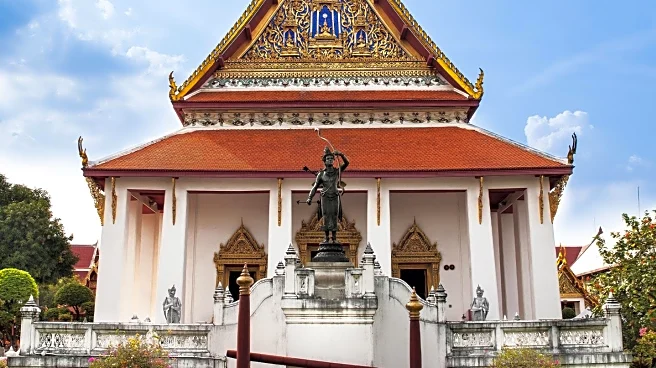What's Happening?
In Thailand, the Jewish community, led by Chabad Thailand and Rabbi Yosef Kantor, is navigating a complex emotional landscape following the October 7 terrorist attacks in Israel. The community, which has
grown significantly over the past three decades, now numbers between 5,000 and 7,000 individuals, many of whom are digital nomads, retirees, or temporary residents. Despite the global rise in antisemitism, Thailand remains a welcoming environment for Jews, with rare instances of antisemitism. The community is also strengthening its security measures, a practice that intensified after the 2008 Mumbai terror attacks. A new Jewish Community Center is being developed in Bangkok to serve as a cultural and spiritual hub.
Why It's Important?
The situation highlights the resilience and adaptability of Jewish communities in diaspora, particularly in regions where they are not historically established. Thailand's Jewish community serves as a model of cultural integration and religious practice in a predominantly non-Jewish society. The community's growth and the establishment of a new center underscore the importance of cultural preservation and the role of religious institutions in providing stability and continuity for diaspora communities. This development also reflects broader trends of global mobility and the increasing importance of digital nomadism in shaping modern diasporas.
What's Next?
The completion of the new Jewish Community Center in Bangkok will likely enhance the community's ability to host cultural and religious events, fostering greater cohesion among its members. As global tensions continue, the community may further strengthen its security measures and deepen its engagement with local Thai society to maintain its harmonious coexistence. The center could also become a focal point for interfaith dialogue and cultural exchange, promoting understanding and cooperation between different communities in Thailand.
Beyond the Headlines
The Jewish community in Thailand exemplifies how religious and cultural identities can be maintained and even flourish in diverse settings. The community's experience highlights the potential for religious institutions to act as bridges between cultures, fostering mutual respect and understanding. This case also raises questions about the future of global Jewish communities in an increasingly interconnected world, where traditional boundaries and identities are constantly being reshaped.











